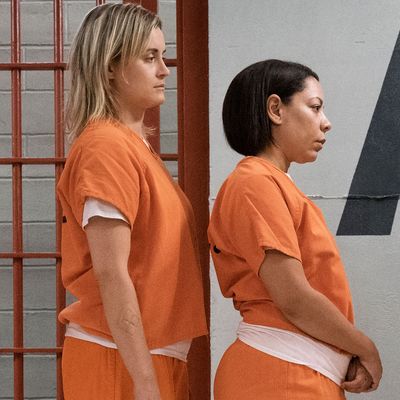
When GLOW premiered on Netflix last year, I was overwhelmed by how quickly and deeply I fell in love with it. But I also found room in my heart for pity … for the producers of Orange Is the New Black. The shows branch off from the same family tree, sharing a production company and an executive producer in Jenji Kohan. But whereas a season of GLOW (ten episodes of a half-hour each) feels as tight and lean and powerful as its wrestlers’ sinewy thighs, Orange Is the New Black (13 episodes, each at least an hour long) can be flabby and slow even when it’s at its best.
And the season-six premiere is not its best, opening with an extended fantasy sequence in which Suzanne hallucinates her fellow Litchfield inmates in various TV formats as she flicks through channels. Nicky is done up like Rowlf. Daya’s beating is transformed into a modern-dance routine. Piper’s on Jeopardy!, but the only question she can ask is “Where is Alex?” It takes eight long, indulgent minutes to get us to the real world, in which an unmedicated Suzanne, assisted by her lawyer and her mother, is being interrogated about Piscatella’s death, while Suzanne’s team begs the prosecutor to get her back on her meds and return her to gen pop.
Until that happens, Suzanne is not going to be very useful. Through flashbacks, we watch Suzanne and Black Cindy hiding while guards stage the scene of Piscatella’s murder at the abandoned pool, find a gun (loaded with nonlethal ammunition), and come up with their own version of events: “One of the ladies — the old lady; maybe one of the black ones — she’s shooting wild. She’s not leaving here without blood on her hands.” In this fairy tale, Piscatella martyrs himself by tackling whichever inmate they decide to pin it on, and getting shot in the face. Black Cindy keeps Suzanne quiet and convinces her that they need to let guards find them somewhere else; indeed, guards later locate them in a closet, and Suzanne and Black Cindy avoid questioning by pretending to be deaf.
The ringleader inmates are eventually loaded onto a bus, where Red disseminates the cover story: They weren’t in the pool resisting; they were being held hostage by Piscatella. But Black Cindy’s just convinced Suzanne to stick to their storage-closet cover story when the hostage tale makes its way to them and Suzanne freaks out about keeping all the lies straight.
So: back to the present day. All the Litchfield inmates are in Administrative Segregation (ad seg for short) in a maximum-security facility, meaning they’re each in a one-person cell. When Daya is allowed outside for an hour, she’s locked in a cage at the edge of the yard. Everyone else has to take their exercise walking circles inside. The guards participate in a sick Fantasy Inmate draft: Frieda’s a hot prospect because her suicide attempt (which she survives) is worth seven points. Daya is suffering an untreated broken rib. Taystee is beaten in her cell. When Mendoza attacks Ruiz (over the latter’s collaboration with the guards at the end of season five), guards hose them off in the shower and then force them to make out. Litchfield Max is brutal.
Though the focus is on the inmates we’ve known over the years, a few new ones are introduced.
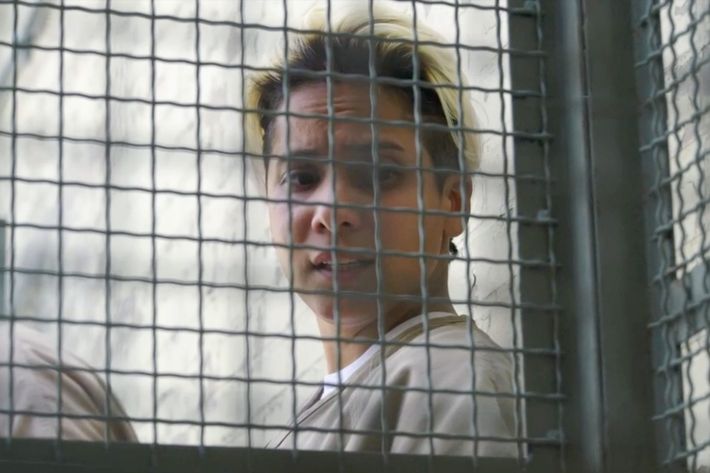
One admires Daya’s guard-murdering reputation and slips her a Snickers into her cage. Daya’s benefactor moves on, leaving their partner to inform Daya, “Daddy likes blondes, so you’re not his type.” Daya assures Daddy’s partner that, since Daddy is not a man, Daddy isn’t her type either (respect people’s pronouns, Daya!), but this seems like a situation that could complicate Daya’s life soon.
Taystee also discovers that a figure from her past has made it to Litchfield Max, though not as an inmate.
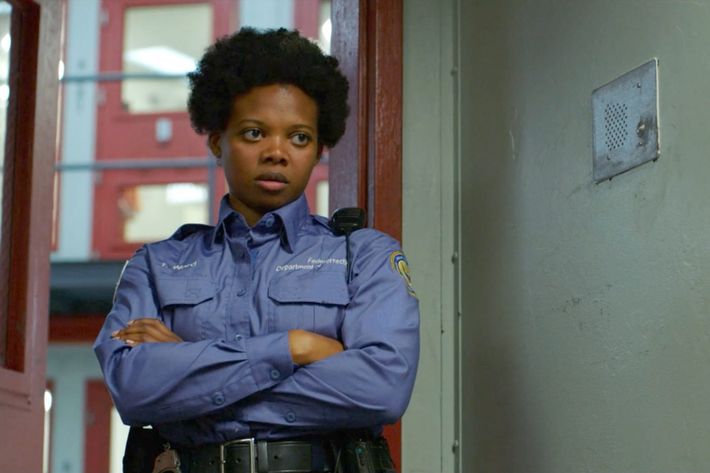
Ward and Taystee worked together at a place called Storky’s, and since Taystee knew then that Ward was serving food and keeping the cash and never narced on her, Taystee’s not interested in hearing from Ward that she “should’ve stayed on the path,” since it’s only due to luck that each of them is where she is now. Storky’s was a long time ago, Taystee says, and now Ward is “on the team that killed my friend and beat on me.” “Bitch, I came in here to be nice to you, and you want to talk about teams?” Ward shoots back. “Your team killed two players on mine.” That two guards are dead is news to Taystee, but in her current circumstances, she can’t get any more information.
Red is also forced to make room in her solo cell for Murphy, better known as Badison.
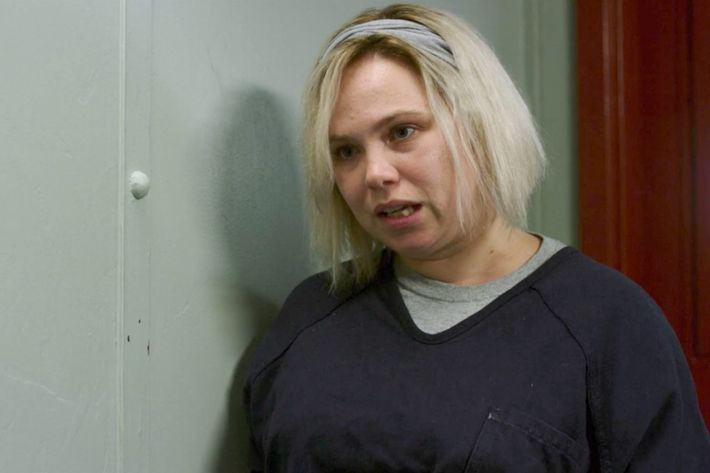
On their way to the showers, Piper sees the cast on Badison’s arm and tries to find out whether Badison saw Alex in medical. Badison answers vaguely before shoving Piper hard enough to knock herself out when her face hits the floor. “She wanted to go to medical and find her friend,” Badison shrugs when Red confronts her. “Now she’s going to medical. She owes me one, if you ask me.” When Piper wakes up there, she learns from another patient that the woman who had been in her bed died that morning, but then can’t stand to find out whether the description of the deceased matches Alex’s.
Having made it, with her mother’s help, through a psych evaluation and now medicated, Suzanne has another interview with the prosecutor, over White Castle — except now she wants to know where her mother is. To her lawyer, that she’s not seeing her mother proves she’s better, since, we now understand, her mother was never actually there. The prosecutor asks whether Suzanne was in the basement, and after corrects him that it was a pool, she says she wasn’t. If she wasn’t there, he asks, how did she know it was a pool? She calmly says she heard other inmates talking about it on the bus. She keeps her head together, does Black Cindy proud, and is told she may now go “home.” But …
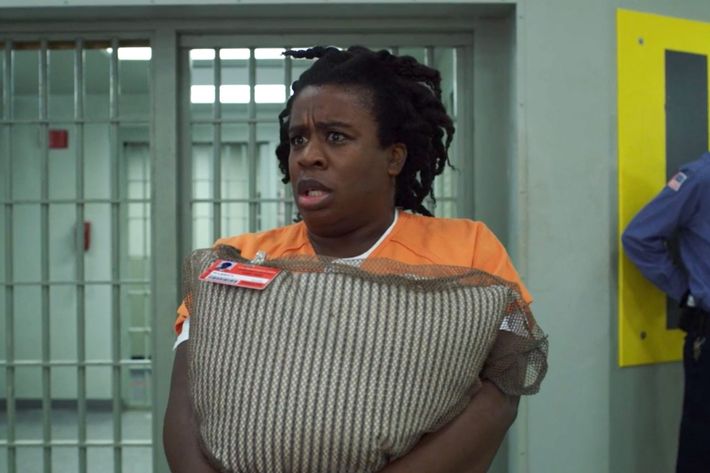
“This is not home,” Suzanne worriedly tells the guard leading her into Litchfield Max gen pop. “It is now,” he replies.

